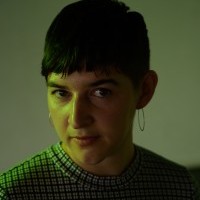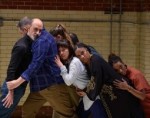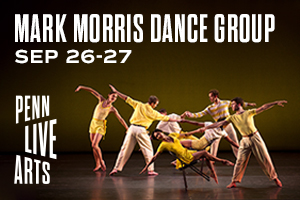
Mary Overlie: Near, Far, and Infinite Presence
by Miryam Coppersmith
Mary Overlie is a performer and choreographer, the originator of The Six Viewpoints, author of Standing in Space, and co-founder of Danspace Project, Movement Research, the Pro Series Internationale Tanz Wochen Wien (Vienna), and the Experimental Theater Wing at New York University. On June 5th 2020, Overlie passed away from leptomeningeal cancer in her home state of Montana.
While Mary was still in hospice care, I interviewed five of the thousands of artists Mary has influenced: Barney O’Hanlon, Brendan McCall, Deborah Black, and original members of Overlie’s company, Paul Langland and Wendell Beavers. You can read their recollections about Mary and the Viewpoints in part one of this series. Part two focuses on the relevance of the Viewpoints during the COVID-19 crisis and the future of the Viewpoints.
While I conducted these interviews separately, in the spirit of Overlie’s non-hierarchical practices, I’ve woven together the perspectives here.
Brendan McCall: In the Mary Overlie philosophy, it's like we're in this moment now, this moment's never happened, so let's listen to this moment together because none of us really know what this moment is.
Viewpoints Under Quarantine
The Six Viewpoints outline the materials (of performance and life): Space, Shape, Time, Emotion, Movement, and Story. The theory also includes the Bridge, a series of laboratories for discovering and working with the materials. I asked the interviewees which Viewpoints have become heightened for them during quarantine.
Deborah Black: I wouldn't say any one of them is really popping out… maybe Space. Just because space feels "limited" somehow. Especially during the first weeks, Story was a big one. Allowing the stories of this moment to stay complex and not just all converge into the dominant narrative that's happening.
And with that comes Emotion—that I'm allowed to feel how I feel, and it doesn't have to be a certain way. To me that's a huge one in this moment. My emotions are mine, and I get to choose them. That's something I learned after living in New York City on September 11th.
Barney O’Hanlon: From the materials—Emotion. Just as when you study Emotion with Mary, you discover that it's not just one thing. It is constantly changing. I have noticed that in myself every single day. I let myself surf and just ride the different currents...
Then, of course, Time. Time is so loud right now. In its elasticity.
And then Space—you discover that people don't really understand space, when you go out and try to keep six feet away from somebody else while you're walking your dog. ...
You know what else I'm using a lot now, from the Bridge, is News of a Difference; because the days are so similar, I find myself needing—like food—needing to pay attention to what I hadn't seen before or noticed before, and it gives me a lot of fuel and energy and pleasure.
Wendell Beavers: I am fearful myself, and heartbroken for the hardships facing those over 60, Black, Hispanic, and native populations of all ages, because of systemic racism, inequality, and the basic greed and genocide that the wealth of the U.S. is based on. Regarding the virus and the ethos of the Viewpoints: the enforced slowing down, disengagement from distraction, and overall disruption that the virus is causing confirms the Viewpoints’ central insistence on non-aggression and embrace of reality.
Teaching Viewpoints Online
Deborah Black has been teaching Viewpoints online since 2018.
DB: What I found with the virtual class is that you can't fall into other people. I open people up to a set of instructions and it's like, okay [she laughs and looks around her], here I am alone in my space, how do I do that thing that a lot of people consider to be an ensemble training?
What I hope I can do through these classes is provide a practice of presence. It's a palpable experience. Even if you're alone in your house, you can practice performance. Maybe we could get really good at it even though we don't have stages. If I can let my walls see me, maybe I can let an audience see me.
But it doesn't feel adequate at this moment; I feel heartbroken that I can't go see a show tonight.
The Future of the Viewpoints
DB: This summer, Mary told me that she created an entire program for dancers that was never implemented, and it felt very resonant to me because I can be very critical of the way dancers are trained. She has a whole vision of how dancers could start to be trained that would allow them to be whole humans with agency.
BOH: Sadly I wasn't able to go to any of the workshops Mary did last spring and summer, but both Mary and Wendell inform me that she wasn't done with the work. That she still had one more step to go, and one aspect of that step was dismantling the institutionalized Viewpoints. …
Mary says our minds have been colonized, just like everything else has been colonized, so we need to reify our relationship to that colonized mind to get back to a place of purity, almost, but that's not the right word.
It's sort of like she's taking the dynamite to the work, which makes perfect sense if you know Mary. No it isn't this, HAHA Boom! That's so Mary; I love it so much. She is the Original Anarchist.
Paul Langland: It's like anything, you have an original insight or breakthrough and people get excited about it, they study it. There's always a struggle to ventilate the human impulse that leans toward systemization, nailing things down, and turning human insight into a closed system. That struggle exists in the Viewpoints world. Mary's brilliant horizontalizing of creative values will keep the use of Viewpoints fresh and reconsidered in many different ways into the future.
BOH: Mary and I talked about this back when we were together—imagine if politicians understood the work, how different the world would be and how different our country would be. It would be nice to see it go in that direction. Fewer hierarchies and more horizontality, more collaboration.
BM: Push it, push the boundaries, stretch the envelope. There's a dutifulness with how people are doing the Viewpoints. I never got that sense from Mary. Remember that you're an artist.
For more on Mary Overlie and the Viewpoints, see https://sixviewpoints.com/
Interviews with Brendan McCall, Deborah Black, Barney O’Hanlon, Paul Langland, and Wendell Beavers, conducted via Zoom, April 27-May 14.
By Miryam Coppersmith
June 9, 2020








